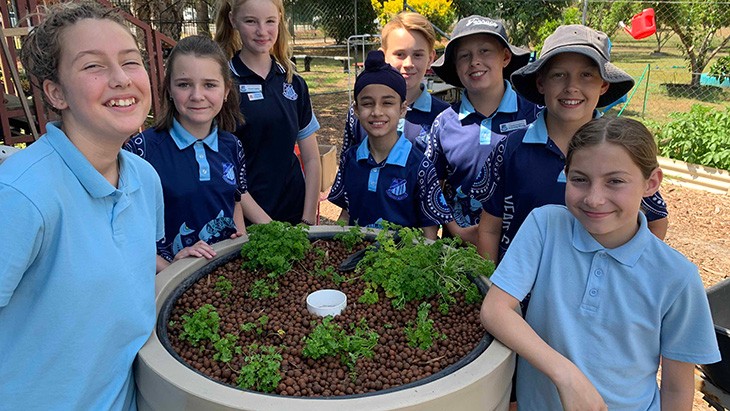Sustainable Schools Grants
School Infrastructure’s Sustainable Schools Grants program has helped over 640 schools to deliver hands-on sustainability projects linked to the NSW curriculum. This $10m program encouraged student-led activities which enhanced the sustainability of school environments.
Between 2019 and 2023 all NSW public schools and preschools were able to apply for funding up to $15,000 for initiatives to improve:
- biodiversity and connect students to nature
- energy, water and waste efficiency
- environmental education, behavioural change and capacity building.
Previous Sustainable Schools Grants projects
Video:
Coledale Public School - Connecting Threads Up-cycling Project 2023
Video:
Erskine Park High School - Waste Audit 2019
Mt Ousley Public School
Pop-up market garden stalls, worm farming workshops and beehive keeping were just some of the activities Mt Ousley Public School students embarked upon when they tapped into local community expertise and resources.
When Wollongong City Council officers ran composting and worm farming workshops for schools, the students at Mt Ousley were inspired to produce videos, presentations and signage to educate their entire school community about waste initiatives.
Their composting system now diverts about 8.5 kg of waste from landfill each day and fertilises their garden beds.
A parent beekeeper educated students about the importance of bees and how bees make honey, and the school has since purchased a native beehive.
A local community expert was engaged to work with the children to educate, design, and construct 6 'no dig' garden beds. The gardens now provide vegetables and herbs to students and the community. One of the major highlights for students was "cooking produce from our garden with our parents".
Students have gained an in-depth understanding of the sustainable benefits of 'paddock to plate' and taken this idea one step further by using a pop-up market stall concept to allow the community to purchase produce harvested from the school's garden.
Staff have also benefited from teacher professional learning and advice from local visiting professionals. This has increased their confidence and willingness to use and contribute to the ‘food forest’.
"We've enjoyed watching the excitement, achievements, failures, curiosity and pride the students have gained from their involvement. Their general wellbeing has improved, and they are engaged in their learning," one staff member said.
The school's top tip to other schools interested in implementing a Sustainable Schools Grants project is the importance of forming a committee and getting buy-in from school staff, according to project lead Sally Anderson. “It became easier to run the program when more staff became involved,” she said.


